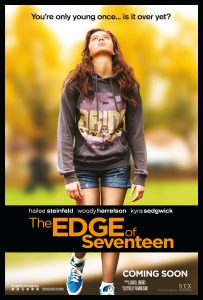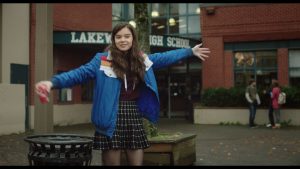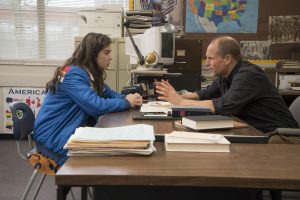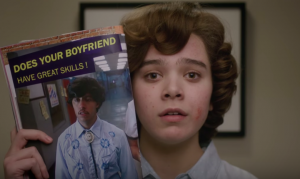
I can hear the complaint now: kids don’t talk like that. A pre-pubescent kid wouldn’t tell another kid, and I quote, “Nobody likes you and I hope you get AIDS!” I would counter that argument with an anecdote from my childhood, in which a ten year-old me was told by another ten year-old, and I quote, “You should kill yourself because you’re a waste of space!” I’m not trying to garner sympathy; just proving that kids can be assholes! So yes, some kids do talk like that.
“The Edge of Seventeen” isn’t about hateful ten year-olds or else it’d be called “The Edge of Ten” (which sounds like a Christian rock group). It’s about self-obsessed seventeen year-olds drifting through life in that awkward transitional stage. We’ve all been there: puberty is in full-force, hormones are running wild, one’s independence feels smothered by parents and teachers. Everybody else seems to fit into life all the while you’re alone in your cumbersome misery. The feeling of isolation causes you to become ignorantly selfish, shutting down everyone else’s problems in favor of yours. It’s not that you’re inhumane; you just can’t grasp the concept of others’ shortcomings. You see the world as naively perfect, with its inhabitants as naively perfect. Others can’t have problems because, unlike you, they don’t address them as overtly.

Nadine (Hailee Steinfeld) is the embodiment of the awkwardly self-obsessed seventeen year-old. She views the world as vain and cruel, taking her beloved father away from her years ago. The last remaining glimmer of hope is her best friend, Krista (Haley Lu Richardson), who has stuck by her side ever since she was told that she deserved to contract AIDS. When Krista falls in love with her brother, Darian (Blake Jenner), Nadine loses all hope. She can’t even process the idea that Krista could actually be in love with her brother, believing it to be deep-seated revenge. How else can she explain Krista falling for the manifestation of narcissism?
The original title for this film was “Besties,” as the plot synopsis focuses solely on the rift between the two friends. I’m glad they changed it, as “The Edge of Seventeen” is more definitive of the message. This isn’t a film about two best friends drifting apart, but a journey of self-discovery. The break-up, so to speak, is nothing more than a catalyst for Nadine’s self-evaluation. To single that act out would be to miss the point.

This journey of self-discovery will bring about a complaint reminiscent of the one at the beginning: teenagers don’t talk like that. A teenager wouldn’t wax philosophically about the vanity of millennials or narrate their life’s woes like a poet. I’d argue that a litter of teenagers are “old souls,” as Nadine put it, lashing out superciliously to prove their worth. This plays into the snooty narration, which is more fine-tuned because, like a passage in a book, it’s not spontaneous but carefully crafted over. Of course her narration is going to be cleverly haughty, as it soothes her soul and ego, just as this and any of my reviews do for me.
But what about the clichés riddled throughout? Surely those aren’t representative of teenage life, but of the Hollywood formula. Would a teenager like Nadine go through losing her best friend, stumble through a crush, ignore the hopeless romantic who’s clearly right for her, partake in a nonstop stream of arguments with her family, be misunderstood by a kind but abrasive teacher, and contemplate suicide all in a seamless transition? No, not necessarily. The character of Nadine is admittedly following a pattern to complement a basic storyline narrative. That’s more of a necessity than a flaw, however, one that is ironed out with solicitude.

What makes the formula work is that writer/director Kelly Fremon Craig isn’t adhering to the clichés, but embracing them. She acknowledges that the clichés are derivative of actuality, only made to feel fake by hollow storytelling. When one cares deeply about the characters partaking in the tropes, it makes them sustainable. There’s a comfort in the familiarity in which a coming-of-age story such as this thrives on. I didn’t want a film that would reinvent the wheel, but embrace it for its habitual honesty. Funny how she’s able to convey this with cheeky pop culture references that don’t nearly break the fourth wall in arrogant fashion ala “Billy Lynn’s Long Halftime Walk.” It helps that her direction is conservative, not drowning her screenplay in references and teenage lingo as Diablo Cody is prone to do (and this is coming from someone who loved “Juno”).
I felt for Nadine when she’d lock herself in her room, hopelessly (and somewhat pathetically) browsing through her crush’s photos, as I had been there at one point in my life. I too internally lashed out at a friend for dating my crush, feeling a sense of betrayal as opposed to joy for their happiness, just as Nadine is guilty of. I also selfishly ignored the plights of my family, failing to realize their emotional struggles in favor of my own, just as Nadine does with her brother and helpless mother, Mona (Kyra Sedgwick). This comfort of familiarity carried me to adulation, upheld by compassionate direction that keenly observes the inner workings of teenage angst.

Craig even subverts expectations from time to time, keeping the viewers on their toes. As Nadine segues into the worst happening of her life, one expects it to be the impending death of her father. After all, her focus has been on her doting father, Tom (Eric Keenleyside), so it’s only natural that his death is what she’s referring to. Except it’s not. Her segue is into the onset of puberty, her face breaking out in unsightly fashion. And then her father dies of a heart attack later that night with her in the car. This isn’t an innovative approach, but a welcomed one to complement the unpredictability of life, no matter how mundane it may seem.
That’s not to say most expectations aren’t met. Anyone watching this film can catch on early that Hailee will eventually fall in love with the nerdy Erwin (Hayden Szeto), that Mr. Bruner (Woody Harrelson) has a soft heart underneath his gruff complexion, that Darian isn’t as perfect as he seems, and that everything will be tied up with a nifty little bow in the end. What matters not is the predictability, but that its formula is earned. “The Edge of Seventeen” earns every cliché it doles out, as Craig’s affection for the characters is reciprocated by the viewer. The supporting characters don’t feel like McGuffins, even when they are, as their actions feel motivated and earnest. Nadine is deserving of her happy ending because she fought for it and sincerely accepts her epiphany.

Kelly Fremon Craig is deserving of her platitude as she vigilantly avoids converting the film into an after-school special. The come-ons of Nadine’s crush, Nick (Alexander Calvert), cautiously evade the easy pratfall of unwarranted sexual advances. Whenever Nadine says stop, he does so, frustratingly so. He never forces himself onto her, but is angrily confused over her implications. After all, she sent him a racy text that was anything but subtle, so how is he wrong for feeding her desires? This is a brilliant scene because it highlights the frightening scenarios that could arise all the while making Nadine confront her own culpability. It would’ve been easy to take the after school special route and I’m glad Craig eschewed it.
I also appreciated how Craig avoided the banality of the ugly duckling scenario. A common complaint lodged against these films is that the protagonist is portrayed as ugly, despite being played by a gorgeous young actress (i.e. Rachael Leigh Cook in “She’s All That” and Mae Whitman in “The Duff”). Here, Nadine’s low self-esteem isn’t the result of appearance, but emotional duress. She believes she is ugly only because her personality dictates that. In reality, she’s an outcast because of her social anxiety and trust issues, just as Erwin is. Both are traditionally attractive, but that doesn’t matter. What matters is their disposition and how that guides them. That’s the message these coming-of-age stories should be about, not that taking your glasses off and gaining the smallest modicum of confidence will turn you into a knockout.

Maybe the film is a bit too formulaic. Maybe it is a bit too cutesy for its own good at times. Maybe the characters are a bit too peppy and sarcastic, acting as such to garner cheap laughs from the audience. Maybe the graphic discourse is slightly gratuitous as to remind us that teenagers do indeed talk about sex candidly. Maybe the happy ending is too mushy and clichéd. I don’t really care all that much, as I loved it, warts and all!
P.S. It’s a shame a film such as “The Edge of Seventeen” is slapped with an R-rating. The justification is a few f-bombs and sexual innuendoes, most of which are seen in other PG-13 teen comedies. Here, in an honest and frank film, it is slapped with restriction, whereas the mindless comedies are given a pass due to lightheartedness. Shame on the MPAA.
Final Rating: A-
